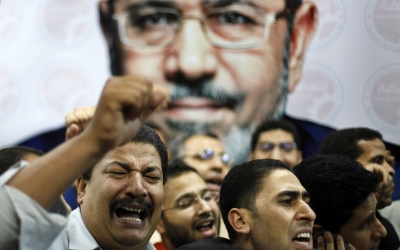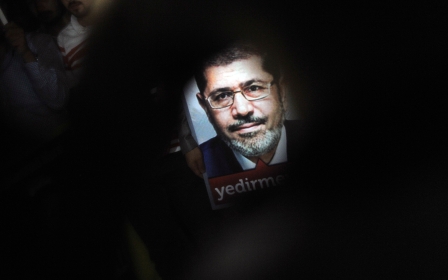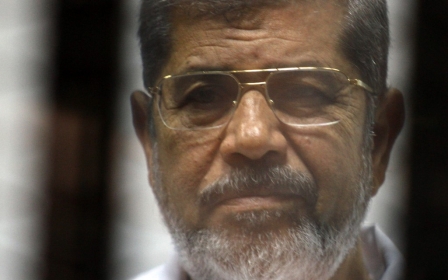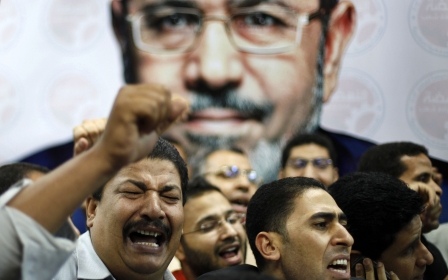Former Egyptian president Morsi buried in Cairo with family present
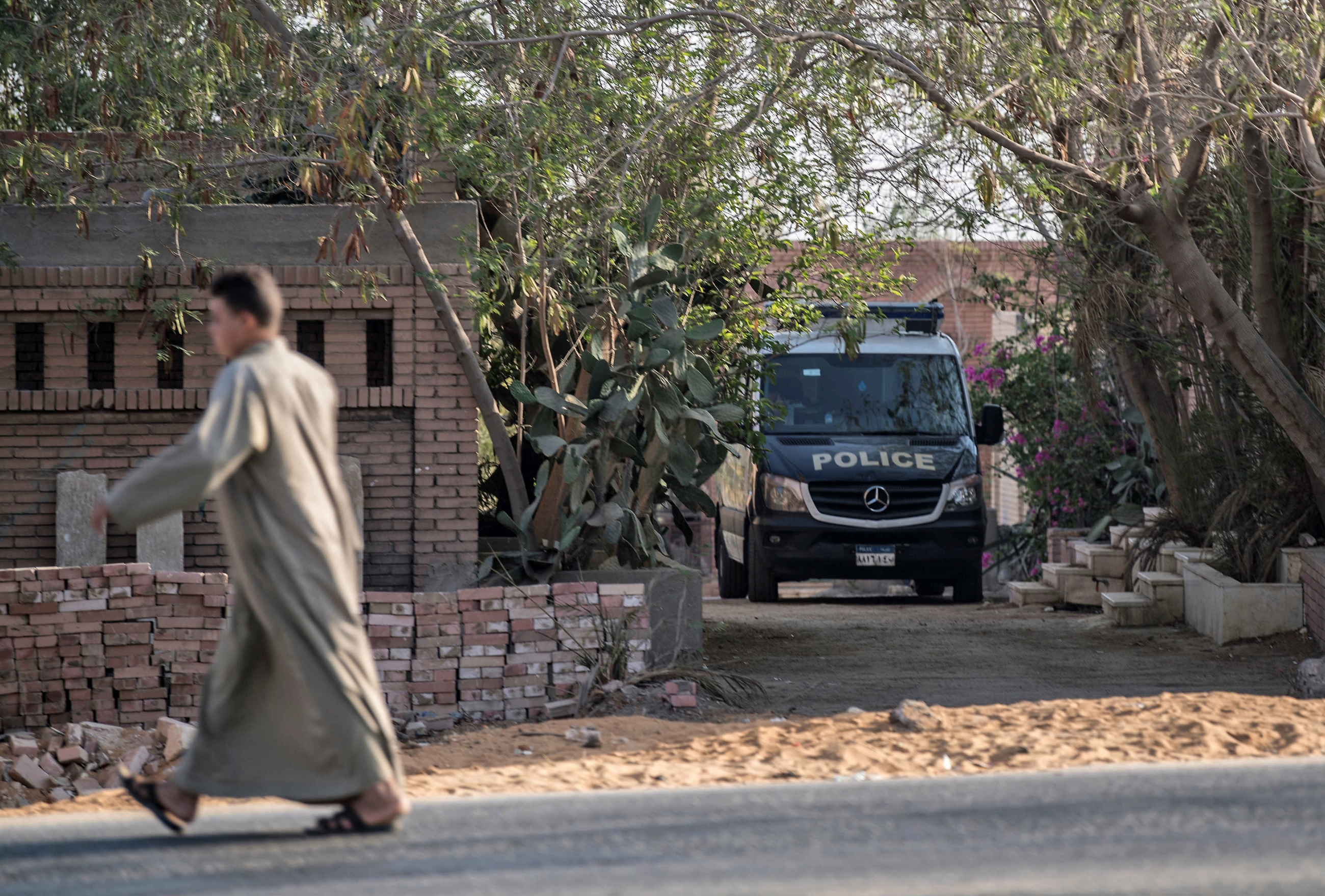
Former Egyptian president Mohamed M0rsi has been buried alongside other senior figures of the Muslim Brotherhood in Cairo, his son, Ahmed Mohamed Morsi, has said.
The burial was attended by members of the family in the capital's Madinat Nasr after authorities refused burial in Morsi’s home province of Sharqiya in the Nile Delta, Ahmed said.
"We washed his noble body at Tora prison hospital, read prayers for him at the prison hospital... and the burial was at the Muslim Brotherhood spiritual guides," Ahmed wrote on Facebook.
Morsi, 67, died on Monday after collapsing in a Cairo court while on trial on espionage charges.
Authorities and a medical source said he died of a heart attack, the Reuters news agency reported.
New MEE newsletter: Jerusalem Dispatch
Sign up to get the latest insights and analysis on Israel-Palestine, alongside Turkey Unpacked and other MEE newsletters
An account of Morsi's final moments, which was obtained by Middle East Eye and details of which have been corroborated by other reports of the court session seen by MEE, described people banging on cages, shouting for security and screaming following Morsi's collapse.
Security forces were said to have taken everyone out of the courtroom.
UN calls for independent investigation
The United Nations human rights office called on Tuesday for an independent investigation into Mori's death, saying it should encompass all aspects of his treatment during nearly six years in custody.
“Concerns have been raised regarding the conditions of Mr Morsi’s detention, including access to adequate medical care, as well as sufficient access to his lawyers and family, during his nearly six years in custody," UN human rights spokesman Rupert Colville said in a statement.
"He also appears to have been held in prolonged solitary confinement.
"The investigation should be carried out by a judicial or other competent authority that is independent of the detaining authority and mandated to conduct prompt, impartial and effective investigations into the circumstances and causes of his death," he said.
In the final moments of his life, Morsi urged a judge to let him share secrets which he had kept even from his lawyer, according to an account obtained by MEE.
Morsi said he needed to speak in a closed session to reveal the information - a request the deposed president had repeatedly appealed for in the past but never been granted.
Standing before the court, the man whose presidency ended in a bloody military coup, said he would keep the secrets to himself until he died or met God. He collapsed soon after.
Multiple sources have told MEE that the Egyptian government's religious authority has issued a warning to imams and preachers, instructing them to avoid funeral prayers for anyone in mosques throughout the country.
Egypt's 'tyrants'
Turkish President Recep Tayyip Erdogan slammed Egyptian authorities for burying Morsi discreetly with only a small number of family members and confidants attending and journalists barred from the site.
"They are even scared of his dead body," he said on Tuesday.
In a televised speech in Istanbul on Monday, Erdogan, a close ally of Morsi, said: "History will never forget those tyrants who led to his death by putting him in jail and threatening him with execution."
The Turkish leader described Morsi's death as a "symbol of persecution targeting him and his people" and called the former president a "martyr".
"In our eyes, Morsi is a martyr who lost his life for the sake of a case he believed in," he said.
Hundreds of Muslim Brotherhood members took to the streets of Turkey's capital and Istanbul on Tuesday, some of them blaming Cairo authorities for the death.
Hamas, which governs the besieged Gaza Strip and is an offshoot of Morsi's Muslim Brotherhood movement, paid tribute to Morsi on Monday.
The group praised Morsi's "long struggle spent in the service of Egypt and its people, and primarily the Palestinian cause".
Qatar's ruler Sheikh Tamim bin Hamad Al Thani expressed his "deep sorrow" on Monday following Morsi's death.
Qatar was a leading backer of the president during his turbulent year as Egypt's leader and Morsi faced trial after the 2013 military coup for allegedly spying for Doha.
"We received with deep sorrow the news of the sudden death of former president Dr Mohamed Morsi. I extend to his family and to the Egyptian people brotherly condolences," Al Thani wrote on Twitter.
Egyptian-born leading Muslim Brotherhood cleric Sheikh Youssef al-Qaradawi issued a statement mourning Morsi from his exile in Qatar, where his presence has infuriated both Egypt and its Gulf allies
Yemeni Nobel Prize winner Tawakkol Karman said: "I mourn, for myself and all the free people of the world, the death of great striver in the path of freedom great president Mohamed Morsi.... President Morsi has gone and [Abdel Fattah el-]Sisi, one of the curses that befell Egypt, has remained."
Prison conditions criticised
Morsi, Egypt's first freely elected leader and a top figure in the now-banned Muslim Brotherhood, had been in jail since being toppled by the military in 2013.
He came to power following the 2011 popular revolution that toppled longtime autocrat Hosni Mubarak.
Born and raised in the Nile Delta, Morsi was an academic and engineer who rose to seniority in Egypt's Brotherhood, before winning the 2012 presidential election as the group's candidate.
Almost seven years ago exactly, Egyptians were voting in the second round of the presidential election that Morsi would go on to win. Egypt has not had a free democratic vote since.
Morsi was removed from power and jailed in a 2013 military coup led by his defence minister, Sisi, who then replaced him as president.
Morsi’s health had reportedly deteriorated over the course of his nearly six-year incarceration, according to the findings of a panel of British politicians and lawyers who warned last year that could die prematurely as a result of inadequate medical treatment.
His death is likely to pile international pressure on the Egyptian government over its human rights record, especially conditions in prisons where thousands of Islamists and secular activists are held.
Middle East Eye delivers independent and unrivalled coverage and analysis of the Middle East, North Africa and beyond. To learn more about republishing this content and the associated fees, please fill out this form. More about MEE can be found here.



